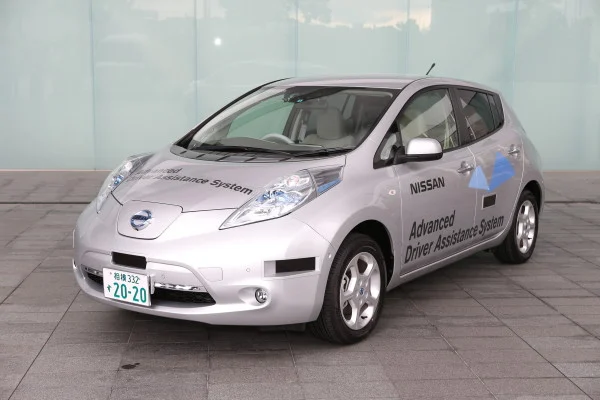Autonomous driving, whether or not you like it, is coming. Not tomorrow, and perhaps not in three years as Tesla Motors hopes. But it will be here, perhaps as early as the end of this decade.
That’s what the big auto manufacturers seem to be aiming for, and electric cars, given their advanced technological nature, are at the heart of this “robots driving your car” movement. Nissan, among others, has been tinkering with this, and now its got permission from Japanese officials to take it to the roads of that island nation.

image via Nissan
Nissan said in late September it had taken delivery of “Japan’s first license plate for a car equipped with highly advanced driver assist systems.” This essentially clears the way for a specially equipped Leaf to take to the roads legally, hosting a range of technologies under the Autonomous Drive moniker. These include:
- Lane keeping
- Automatic Exit
- Automatic lane change
- Automatic overtaking slower or stopped vehicles
- Automatic deceleration behind congestion on freeways
- Automatic stopping at red lights
Though outfitted with these highly advanced driver assist systems, the electric Leaf is designed as well to allow the driver to manually take over control at any time. It is reasonable to assume as long as autonomous driving exists, this manual control will be a must for most getting behind a robotic wheel.
The Japanese automaker is working to achieve what it describes as “virtually zero fatalities in accidents involving its vehicles. The goal stands alongside zero emissions as a key pillar of Nissan’s research and development.” The Autonomous Drive project is part of a larger initiative known as “Nissan Safety Shield, which monitors a 360-degree view around vehicles for risks, gives warnings to the driver, and automatically intervenes if necessary.”
Besides Nissan and Tesla, others exploring the idea of autonomous vehicles inside and outside of the automotive industry include Volvo, Hitachi, General Motors andGoogle. They are all involved in a variety of pilots to understand the realities of this emerging technology, such as one currently ongoing in Singapore.






